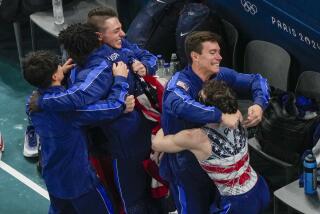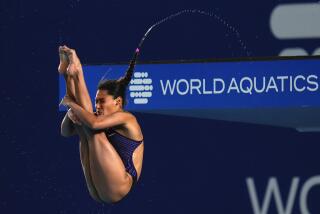THE SEOUL GAMES / DAY 4 : Diver Overcomes Fear With Golden Touch : Louganis Doesn’t Let Accident End Quest for Springboard Win
- Share via
SEOUL — Greg Louganis stood at the top of the awards stand, the Olympic gold medal for men’s springboard diving around his neck, and listened as the Star Spangled Banner reverberated through the Chamshil Indoor Swimming Pool Tuesday afternoon. For his coach, Ron O’Brien, the last phrase of the anthem summed up the gold medal performance . . . and the home of the brave.
O’Brien was not exaggerating for the sake of drama. It took courage for Louganis to come back and win the gold medal after hitting his head on the board during the preliminary round.
There is a real danger in diving.
O’Brien was there when Soviet diver Sergei Chalbashvili struck his head that fatal blow during the World University Games in July 1983. Louganis was on the steps of the tower, looking the other way, holding his hands over his ears and humming, so afraid was he that Chalbashvili would not be able to clear the tower on the difficult reverse 3 1/2, that he would hear the dreadful sound. And after Chalbashvili did hit the tower and fall into the pool, Louganis had to continue the competition, diving into the bloody water with the same reverse 3 1/2.
And it’s not as if Louganis had considered himself infallible. He hit the platform, once, during a competition in Tblissi in the Soviet Union in 1979. He was unconscious when he hit the water and had to be pulled out of the pool. He was out for about 20 minutes.
But that, he said, was easier to come back from. He remembers touching his toes, seeing the sun flash between his legs--and that’s all he remembers of that. He didn’t complete the competition, so he had time to recover, both physically and mentally.
Monday night, after he hit the board on his 9th dive, he climbed out of the pool, stunned, and let Dr. James Puffer of UCLA, who is also the U.S. Olympic Committee physician, put 4 quick, temporary stitches in the top of his head so that he could come back and perform his last 2 dives.
Less than 30 minutes later, he completed a reverse 1 1/2 somersault with 3 1/2 twists and, in the final round, a reverse 3 1/2 somersault in tuck position. He secured his place in Tuesday’s medal round. Then he went to a local hospital to get 5 stitches that would hold up throughout the Games.
And yes, it hurt Monday night. There was no physical pain in the medal round, though. He said his pride was hurt more than anything. The challenge was psychological.
“I think it was more difficult to overcome this time than in 1979 because, No. 1, I didn’t have to finish the contest then so I wasn’t up there right away, and No. 2, I don’t remember hitting the platform,” he said.
“It’s more difficult to overcome an injury if you remember the pain . . .
“I was very nervous going into the competition today. When I hit the board last night, it shook my confidence a lot. That’s why the workout this morning was so important. I had to get over the jitters.”
When it was time to go for the gold, the only sign that anything had happened the day before were the two shaved spots on his head that showed where he had hit the end of the board as he came around for the second time on his reverse 2 1/2.
O’Brien said: “The question wasn’t whether he could come back physically, it was whether he could do it mentally. Tan (Liangde) is a great diver, and Greg needed every bit of concentration to beat him. He went out there knowing he would have to do 3 takeoffs exactly the same as the 1 he hit the board on.
“Try that and you’ll find out how mentally tough you are.”
Louganis did not falter once throughout the 11-dive program. He totaled 730.80 points to win the gold, and Tan, the Chinese diver who also finished 2nd to Louganis in the 1984 Olympic Games, took the silver with 704.88 points. The bronze medal went to Tan’s teammate, Li Deliang. Li had 665.28 points.
The medalists were among the leaders all the way. U.S. diver Mark Bradshaw, who had been as far down in the ranks as 8th, fought his way back up to 5th place. But he was a distant 5th, at the end, to West Germany’s Albin Killat, who had challenged for the bronze. Killat had 661.47 points. Bradshaw finished with 642.99.
As always, the show centered on the star. And no doubt about it, Louganis is a star. The focal point of his performance was his 9th dive. He had already successfully completed a reverse, on his 2nd dive. But the question was how he would handle doing the dive that had caused him to clip his head.
As he contemplated the dive, standing at the end of the board, he took a couple of deep breaths, took an extra moment to concentrate, and then went through with a dive that drew scores ranging from 8.0 to 9.0.
He came up laughing.
“I was a little nervous going into my 9th dive, I’m not going to deny that,” Louganis said. “I knew that everyone would be watching the 9th dive very carefully. But I told myself that I had done it many times before, and I could do it again.”
He did it again. Like getting back up on a horse that had thrown him.
Divers always like to stress how rare the serious accidents are. Louganis, himself, was saying just the other day that there have been “only” 2 fatalities in diving. The other occurred last Oct. 22 when Nathan Meade of Australia, a diver considered to be one of the top contenders for his country’s Olympic team, hit his head on the platform while practicing a reverse 2 1/2.
And yet the statistic that counts is the 1 that says, yes, it can happen. It is possible.
More likely on the platform than on the springboard.
“How will this affect my platform performance?” Louganis repeated. “I will have several days to rest and to train . . .
“I know the mistake I made yesterday was that I got to the end of the springboard and I stood up too straight. I ended up over the board instead of pushing away a good distance. I honestly didn’t realize I was over the board, so when I hit it, it was a shock. I did adjust some.
“And I’ll have to be sure to get my hands over my head. If I don’t break the water with my hands, it’s going to hurt.”
Still, all things considered, Louganis didn’t seem to think the stitches on the top of his head or the fear factor would hurt his chances to sweep the gold medals here just as he did in Los Angeles in 1984.
He’s been a competitor for many years. He’s not about to back off now.
As O’Brien said: “Yes, I’m impressed. No, I’m not surprised.”
More to Read
Go beyond the scoreboard
Get the latest on L.A.'s teams in the daily Sports Report newsletter.
You may occasionally receive promotional content from the Los Angeles Times.






